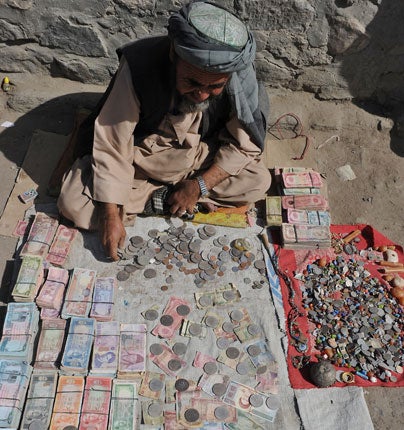Bright symbol of renewed hope tarnished by a greedy, corrupt elite

Your support helps us to tell the story
From reproductive rights to climate change to Big Tech, The Independent is on the ground when the story is developing. Whether it's investigating the financials of Elon Musk's pro-Trump PAC or producing our latest documentary, 'The A Word', which shines a light on the American women fighting for reproductive rights, we know how important it is to parse out the facts from the messaging.
At such a critical moment in US history, we need reporters on the ground. Your donation allows us to keep sending journalists to speak to both sides of the story.
The Independent is trusted by Americans across the entire political spectrum. And unlike many other quality news outlets, we choose not to lock Americans out of our reporting and analysis with paywalls. We believe quality journalism should be available to everyone, paid for by those who can afford it.
Your support makes all the difference.Banks were meant to be the symbol of the new Afghanistan. For the bright-eyed nation-builders, they represented the arrival of capitalism in the Hindu Kush. The emergence of a nascent banking system was seen as one of the finest achievements in the international community's attempts to rebuild Afghanistan after decades of war. The country had a private sector; and it was working.
Kabul Bank was a bright light – quite literally shining as the sun reflected off its glass façade in downtown Kabul – and home to internationally respected financial services like Western Union. Every provincial city I've visited has a branch. Afghanistan's 115,500 police officers draw their salaries from Kabul Bank. ATMs have proliferated across Kabul and beyond – you now can withdraw money in Kandahar City with a UK debit card, if you wish.
But for all the trumpeting of the burgeoning financial sector, Afghanistan remains a cash society. Many people in the poppy-growing districts even use opium as a currency: it keeps, and it's easy to store.
"Cash is still king here," a Western analyst told The Independent recently. "There's been remarkable growth in the banking industry and they're not all Kabul Bank. But borrowing money is both complicated and expensive."
A lot of people – even small and medium-sized entrepreneurs – start out with a bag of bank notes they've been saving under their bed. For those depositors who decided to put their faith in the new system, the scandal unfolding at Kabul Bank is a terrible blow. When news of the bank's failure broke last autumn, police armed with machine guns rolled out razor wire to protect the bank from depositors whose meagre life savings had gone to fund the lifestyles of Afghanistan's elite.
For normal Afghans, hopes for peace and prosperity have been replaced by a cruel reality of political and financial corruption, with a predatory few pushing their country back to the brink, safe in the knowledge that they have the money to get out.
Join our commenting forum
Join thought-provoking conversations, follow other Independent readers and see their replies
Comments